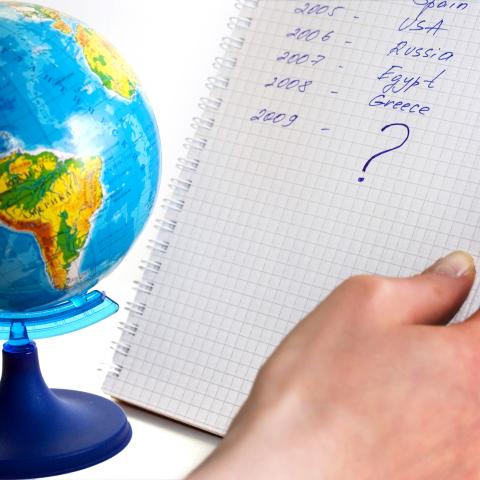
One of the most important language skills to attain is the ability to ask and answer different questions appropriately. This is because once you understand them, you’ll be able to hold conversations with native speakers of that language.
Today, KoreanClass101 will introduce you to the ten most common questions and answers in Korean at different levels of speech. In Korea, there are many speech levels that you can utilize when conversing with people. There are three commonly used speech levels: formal (business level), formal, and informal.
 Table of Contents
Table of Contents
- What is your name?
- Where are you from?
- Do you speak Korean?
- How long have you been studying Korean?
- Have you been to Korea?
- Do you like [country’s] food?
- What are you doing?
- What’s wrong?
- How much is it?
- How is…?
- Want to Learn More Korean? We Can Help You!
1. What is your name?
This is one of the first Korean questions any beginner should learn right away. Let’s have a look at three different ways to ask “What is your name?” in Korean.
1. Formal Phrase – Business Level
| 성함이 어떻게 되세요? (Seonghami eotteoke doeseyo?) – “Could I have your name, please?” 성함이 어떻게 되십니까? (Seonghami eotteoke doesimnikka?) – “Could I have your name, please?” |
성함 (seongham) is a formal word for 이름 (ireum), which is a noun for “name.” In business, it’s offensive to ask someone’s name using the word 이름(ireum), so we use 성함 (seongham) instead to show respect to the person we’re speaking to.
Appropriate Answer – Business Level
| 제 이름은 Bob입니다. (Je ireumeun bobimnida.) – “My name is Bob.” |
제 (je) is a humble way to refer to yourself. 이름은 (ireumeun) means “name is” and 입니다 (imnida) means “it is…”
To answer with “My name is [name],” simply add your name between 이름은 (ireumeun) and 입니다 (imnida). This makes a complete sentence.
Example:
- 처음 뵙겠습니다. 성함이 어떻게 되십니까?
Cheoeum boepgetseumnida. Seonghami eotteoke doesimnikka?
“Nice to meet you. What is your name?”
- 제 이름은 윌슨입니다.
Je ireumeun wilseunimnida.
“My name is Wilson.”
2. Formal Phrase – Conversational Level
| 이름이 뭐예요? (Ireumi mwoyeyo?) – “What’s your name?” 이름이 어떻게 돼요? (Ireumi eotteoke dwaeyo?) – “What’s your name?” |
This sentence structure works exactly the same way as that of the formal phrase we just looked at.
이름 (ireum) is “name” and 뭐예요? (mwoyeyo) and 어떻게 돼요? (eotteoke dwaeyo) mean “what is…” in Korean. You can use this phrase for everyday situations, such as speaking to complete strangers (e.g. cashier, receptionist, waiter, etc.) and building a relationship with someone you’ve just met (e.g. on a date, at school, etc.).
Appropriate Answer
| 제 이름은 Bob입니다. (Je ireumeun bobimnida.) – “My name is Bob.” 제 이름은 Bob이라고 합니다. (Je ireumeun bobirago hamnida.) – “My name is Bob.” |
The answer is exactly the same as the business level one. You can even skip 제 이름 (je ireum), or “my name,” as this is very common to do in conversations.
Example:
- 이름이 뭐예요?
Ireumi mwoyeyo?
“What’s your name?”
- 제 이름은 마이클이라고 합니다.
Je ireumeun maikeurirago hamnida.
“My name is Michael.”
3. Informal Phrase – Conversational Level
| 이름이 뭐야? (Ireumi mwoya?) – “What’s your name?” 이름이 어떻게 돼? (Ireumi eotteoke dwae?) – “What’s your name?” |
You can use these phrases with various people, such as your friends and people who are the same age as you. However, it’s better to start off with a formal phrase when meeting someone for the first time, even if they’re the same age as you. It’s a way to show respect to each other. Eventually, one of you will request to talk informally, and from there, you can start talking to each other in a more casual manner.
Appropriate Answer
| Bob이야. (Bobiya.) – “I’m Bob.” |
이야 (iya) means “it is” in Korean. Add your name before this word to complete the sentence.
Example:
- 이름이 뭐야?
Ireumi mwoya?
“What’s your name?”
- 앨리스야.
Aelliseuya.
“I’m Alice.”
2. Where are you from?

This is one of the most commonly asked questions that Koreans ask foreigners, usually to start a conversation with them.
1. Formal Phrase
| 어디 출신이세요? (Eodi chulsiniseyo?) – “Where are you from?” 어느 나라에서 왔어요? (Eoneu naraeseo wasseoyo?) – “Which country did you come from?” |
어디 (eodi) and 어느 (eoneu) indicate a location. 출신 (chulsin) means “origin” and 나라 (nara) means “country.” Koreans use these phrases a lot, so try to memorize them.
Appropriate Answer
| 일본에서 왔어요. (Ilboneseo wasseoyo.) – “I am from Japan.” 일본에서 왔습니다. (Ilboneseo wassseumnida.) – “I am from Japan.” |
~에서 (~eseo) means “from~,” 왔어요 (wasseoyo) means “came,” and 왔습니다 (wassseumnida) means “come from.” Add the name of your country in Korean in front of ~에서 (~eseo) to complete the sentence.
You can find a list of countries in Korean on our website; if you don’t know how to say your country in Korean, please check it out.
Example:
- 어느 나라에서 왔어요?
Eoneu naraeseo wasseoyo?
“Which country did you come from?”
- 인도에서 왔습니다.
Indoeseo wassseumnida.
“I am from India.”
2. Informal Phrase – Conversational Level
| 어느 나라 사람이야? (Eoneu nara saramiya?) – “What is your nationality?” |
어느 나라 (Eoneu nara) means “which country” and 사람 (saram) means “person.”
Appropriate Answer
| 일본에서 왔어. (Ilboneseo wasseo.) – “I’m from Japan.” |
This sentence structure works exactly the same way as the one above: add the name of the country you want to say to the beginning of the sentence.
Example:
- 어느 나라 사람이야?
Eoneu nara saramiya?
“What is your nationality?”
- 인도네시아에서 왔어.
Indonesiaeseo wasseo.
“I’m from Indonesia.”

Do you speak Korean?
3. Do you speak Korean?
There are many Koreans who can speak English. They’ve been learning English as their second language since they were in primary school, and many of the younger generations spend years in English-speaking countries to become fluent. However, when you travel to very remote areas of South Korea, bilingual or trilingual Koreans will be a rarity. This can make it challenging for you to travel around, especially when it comes to purchasing train tickets or buying specific items. But you can always ask questions politely; it’s better than nothing!
Here are the Korean questions and answers you can use to find out what languages your interlocutor speaks, or let them know your current Korean level.
1. Formal Phrase
| 한국어 할 수 있습니까? (Hangugeo hal su itseumnikka?) – “Do you speak Korean?” |
할 수 있습니까? (Hal su itseumnikka?) means “Can you do ~?” in Korean.
“English” is spelled 영어 (yeongeo), and “Can you speak English?” is 영어 할 수 있습니까? (Yeongeo hal su issseumnikka?).
Do you want to know how to spell or say your language in Korean? Check out our list of the Top 38 Languages Spoken in the World on KoreanClass101.com.
Appropriate Answer
| 조금 할 수 있습니다. (Jogeum hal su isseumnida.) – “Yes, I speak a little.” 네, 잘 할 수 있습니다. (Ne, Jal hal su isseumnida.) – “Yes, I speak fluently.” 아뇨. 못 합니다. (Anyio. Mot hamnida.) – “No, I don’t.” |
Example: 미국에 가본 적 있어
- 불가리어 할 수 있습니까?
Bulgariaeo hal su issseumnikka?
“Can you speak Bulgarian?”
- 아니요, 못 합니다.
Aniyo, mot hamnida.
“No, I can’t.”
2. Informal Phrase – Conversational Level
Here’s an informal way to ask the same question.
| 영어 할 수 있어? (Yeongeo hal su isseo?) – “Do you speak English?” |
Appropriate Answer
| 응, 조금 할 수 있어. (Eung, jogeum hal su isseo.) – “Yes, I speak a little.” 응, 할 수 있어. (Eung, hal su isseo.) – “Yes, I speak fluently.” 아니. 못해. (Ani. Mot hae.) – “No, I don’t.” |
Example:
- 불가리어 할 수 있어?
Bulgariaeo hal su issseumnikka?
“Can you speak Bulgarian?”
- 응, 조금 할 수 있어.
Eung, jogeum hal su isseo.
“Yes, I speak a little.”

4. How long have you been studying Korean?
If you’ve been speaking Korean with your interlocutor, they may be curious how long you’ve been learning. Following are some simple Korean questions and answers you should learn and be prepared for!
1. Formal Phrase
| 한국어 공부한지 얼마나 됐어요? (Hangugeo gongbuhanji eolmana dwaesseoyo?) – “How long have you been studying Korean?” 한국어 공부한지 오래됐어요? (Hangugeo gongbuhanji oraedwaesseoyo?) – “Have you been studying Korean for a long time?” |
얼마나 됐어요? (Eolmana dwaesseoyo?) means “How long has it been since~” and 오래됐어요? (Oraedwaesseoyo?) means “Has it been long since~” in Korean.
To ask about a different language, just add the appropriate word in front of 공부한지 (gongbuhanji) to complete the sentence.
Appropriate Answer
| #년/개월/달 됐어요. (#nyeon/gaewol/dal dwaesseoyo.) – “It’s been #year/month/month.” 한국어 공부한지 얼마 되지 않았어요. (Hangugeo gongbuhanji eolma doeji anasseoyo.) – “It has not been long since I studied Korean.” 한국어 공부한지 좀 됐어요. (Hangugeo gongbuhanji jom dwaesseoyo.) – “It’s been awhile since I’ve been studying Korean.” |
There are various ways to answer this question, and it’s your time to shine. Usually, Koreans don’t appreciate it when someone brags about themselves, so find a way to answer humbly.
년 (nyeon) means “year.” 개월 (gaewol) and 달 (dal) mean “month(s).”
한국어 공부한지 얼마 되지 않았어요 (Hangugeo gongbuhanji eolma doeji anasseoyo) literally means “It has not been long since I studied Korean,” though it’s also a humble way to express that you’re fluent in Korean, but don’t want to show off your skills.
Example:
- 한국어 공부한지 얼마나 됐어요?
Hangugeo gongbuhanji eolmana dwaesseoyo?
“How long has it been since you started studying Korean?”
- 한국어 공부한지 1년 됐어요.
Hangugeo gongbuhanji ilnyeon dwaesseoyo.
“It has been a year since I started studying Korean.”
2. Informal Phrase – Conversational Level
| 한국어 공부한지 얼마나 됐어? (Hangugeo gongbuhanji eolmana dwaesseo?) – “How long have you been studying Korean?” 한국어 공부한지 오래됐어? (Hangugeo gongbuhanji oraedwaesseoyo?) – “Have you been studying Korean for a long time?” |
There’s not much difference, except that the polite form 요 (yo) is removed.
Appropriate Answer
| #년/개월/달 됐어. (#nyeon/gaewol/dal dwaesseo.) – “It’s been #year/month/month.” 한국어 공부한지 얼마 되지 않았어. (Hangugeo gongbuhanji eolma doeji anasseo.) – “It has not been long since I studied Korean.” 한국어 공부한지 좀 됐어. (Hangugeo gongbuhanji jom dwaesseoyo.) – “It’s been awhile since I’ve been studying Korean.” |
There’s not much difference, except that the polite form 요 (yo) is removed.
Example:
- 한국어 공부한지 얼마나 됐어?
Hangugeo gongbuhanji eolmana dwaesseo?
“How long have you been studying Korean?”
- 한국어 공부한지 좀 됐어. 한 4년 됐나?
Hangugeo gongbuhanji jom dwaesseoyo. Han sanyeon dwaenna?
“It’s been awhile. About four years?”

Have you been to Korea?
5. Have you been to Korea?
The person you’re speaking with may be curious about what countries you’ve been to (or maybe you’re the one who’s curious!). Below are some basic questions and answers in Korean that will be useful in a situation like this.
1. Formal Phrase
| 미국에 가본 적 있어요? (Miguge gabon jeok isseoyo?) – “Have you been to America?” 미국으로 여행한 적 있어요? (Migugeuro yeohaenghan jeok isseoyo?) – “Have you ever traveled to America?” |
Appropriate Answer
| “Yes I have” answers: 네, 가본 적 있습니다. (Ne, gabon jeok isseumnida.) – “Yes, I have been.” 네, 여행한 적 있습니다. (Ne, yeohaenghan jeok isseumnida.) – “Yes, I have traveled [there].” 네, 가본 적 있어요. (Ne, gabon jeok isseoyo.) – “Yes, I’ve been there.” 네, 여행한 적 있어요. (Ne, yeohaenghan jeok isseoyo.) – “Yes, I have traveled [there].” “No I haven’t” answers: 아니요, 가본 적 없습니다. (Aniyo, gabon jeok eopseumnida.) – “No, I have never been.” 아니요, 없습니다. (Aniyo, eopseumnida.) – Literally: “No, not.” |
Example:
- 미국에 가본 적 있어요?
Miguge gabon jeok isseoyo?
“Have you been to America?”
- 네, 가본적 있어요.
Ne, gabon jeok isseoyo.
“Yes, I have.”
2. Informal Phrase – Conversational Level
| 미국에 가본적 있어? (Miguge gabon jeok isseo?) – “Have you been to America?” 미국으로 여행한 적있어? (Migugeuro yeohaenghan jeok isseo?) – “Have you ever traveled to America?” |
As you may have already guessed, informal phrases are exactly the same as the formal ones, except that the polite form 요 (yo) is removed from each sentence.
Appropriate Answer
| “Yes I have” answers: 응, 가본적 있어. (Eung, gabon jeok isseo.) – “Yes, I’ve been there.” 응, 여행한 적 있어. (Eung, yeohaenghan jeok isseoyo.) – “Yes, I have traveled [there].” “No I haven’t” answers: 아니, 가본 적 없어. (Ani, gabon jeok eopseo.) – “No, I’ve never been.” 아니, 없어. (Ani, eopseo.) – Literally: “No, there is not.” |
응 (eung) is a casual, conversational word to say “yes” and 아니 (ani) is an informal way to say “no” in Korean.
Example:
- 미국에 가본적 있어?
Miguge gabon jeok isseo?
“Have you been to America?”
- 아니, 가본적 없어.
Ani, gabon jeok eopseo.
“No, I’ve never been.”
6. Do you like [country’s] food?
This question is a great way to start a conversation, especially when you want to go to a restaurant.
1. Formal Phrase
| 태국 음식 좋아해요? (Taeguk eumsik joahaeyo?) – “Do you like Thai food?” |
음식 (eumsik) means “food” and 좋아해요? (joahae?) means “I like~” in Korean. You can add any noun in front of 좋아해요? (joahaeyo?) to say “Do you like ~?” but let’s focus on food here.
To ask about a country’s food, you need to write the name of the country, followed by 음식 (eumsik), meaning “food.” For example, if you want to say “Italian food,” then it would be 이탈리아 음식 (itallia eumsik).
Appropriate Answer
| 네, 태국 음식 좋아해요. (Ne, taeguk eumsik joahaeyo.) – “Yes, I like Thai food.” 아니요, 태국 음식 좋아하지 않아요. (Aniyo, taeguk eumsik joahaji anayo.) – “No, I don’t like Thai food.” |
Example:
- 비빔밥 좋아해요?
Bibimbap joahaeyo?
“Do you like Bibimbap?”
- 네, 좋아해요.
Ne, joahaeyo.
“Yes, I like it.”
2. Informal Phrase – Conversational Level
| 태국 음식 좋아해? (Taeguk eumsik joahae?) – “Do you like Thai food?” |
Appropriate Answer
| 응, 태국 음식 좋아해. (Eung, taeguk eumsik joahaeyo.) – “Yes, I like Thai food.” 아니, 태국 음식 좋아하지 않아. (Ani, taeguk eumsik joahaji ana.) – “No, I don’t like Thai food.” |
Example:
- 태국 음식 좋아해?
Taeguk eumsik joahae?
“Do you like Thai food?”
- 아니, 태국 음식 좋아하지 않아.
Ani, taeguk eumsik joahaji ana.
“No, I don’t like Thai food.”

What on earth are you doing?
7. What are you doing?
This is a useful question to know in any language. Here are a few ways you can ask and answer this question.
1. Formal Phrase
| 지금 뭐하세요? (Jigeum mwohaseyo?) – “What are you doing?” 뭐하고 계세요? (Mwohago gyeseyo?) – “What are you doing?” |
지금 (jigeum) means “now,” and 지금 뭐하세요? (Jigeum mwohaseyo?) literally means “What are you doing right now?”
Do be careful of your tone when you say this, because it may also sound like “What on earth are you doing?!” in Korean. If you’re a big fan of Korean dramas, you’ve probably heard this phrase a lot. If you want to avoid ambiguity, stick to 뭐하고 계세요? (Mwohago gyeseyo?), or “What are you doing?” which sounds friendlier than the previous phrase.
Appropriate Answer
| 지금 일하고 있어요. (Jigeum ilhago isseoyo.) – “I’m working now.” 전화 하고 있어요. (Jeonhwa hago isseoyo.) – “I’m on the phone.” |
There are two simple ways to answer:
- 지금 [noun]하고 있어요. (Jigeum ~ isseoyo.) – “I’m ~ing now.”
- [noun] 하고 있어요. ([noun]~ hago isseoyo.) – “I’m ~ing.”
To complete the sentence, all you need to do is add a noun to the middle of the sentence and at the beginning of the sentence, respectively. For example, if you want to say “I am swimming now,” “swim” is 수영 (suyeong) in Korean. So the full sentence becomes: 지금 수영하고 있어요. (Jigeum suyeonghago isseoyo.)
Example:
- 뭐하고 계세요?
Mwohago gyeseyo?
“What are you doing?”
- 지금 청소하고 있어요. 무슨 일 있어요?
Jigeum cheongsohago isseoyo. Museun il isseoyo?
“I’m cleaning now. What’s going on?”
2. Informal Phrase – Conversational Level
| 지금 뭐해? (Jigeum mwohae?) – “What are you doing right now?” 뭐하고 있어? (Mwohago isseo?) – “What are you doing?” |
If you want to ask this question even more casually, you can say 뭐해 (mwohae), or “What are you doing?”
Appropriate Answer
| 지금 [noun]하고 있어. (Jigeum [noun]~hago isseo.) – “I’m ~ing now.” [noun]하고 있어. ([noun]~hago isseo.) – “I’m ~ing.” |
The rules for constructing each sentence above are exactly the same as for the formal answers.
Example:
- 뭐하고 있어?
Mwohago isseo?
“What are you doing?”
- 공부하고 있어. 무슨일 있어?
Gongbuhago isseo. Museun il isseo?
“I was studying. What’s up?”
8. What’s wrong?
This is such an important question to know, because you never know when your Korean friend will be sick or feeling down. Here are some ways to ask this question, and answer it.
1. Formal Phrase
| 무슨일 있어요? (Museun il isseoyo?) – “What’s up?” 왜 그래요? (Wae geuraeyo?) – “What’s wrong?” 무슨 일 있었어요? (Museun il isseosseoyo?) – “What happened?” 괜찮아요? (Gwaenchanayo?) – “Are you alright?” |
There are various ways to check up on someone in Korean, but the four above are the most common.
Also, to start a conversation, Koreans say: 얼굴색이 안좋아 보여요. (Eolgulsaegi anjoa boyeoyo.) The literal translation of the phrase is: “The color of your face does not look good.” It may sound strange or even offensive, but the phrase means “You don’t look well,” in English.
So if a friend looks sad or seems ill, you can use this phrase followed by one of the “what’s wrong” questions above.
Appropriate Answer
| 아무일도 없어요. (Amuildo eopseoyo.) – “I’m good (nothing is happening).” 괜찮아요. (Gwaenchanayo.) – “I’m okay.” 아, 그게 말이죠 (A, geuge marijyo…) – “Uh, actually…” 사실은요 (sasireunyo) – “Actually” |
There’s no fixed answer to “What’s wrong?” because you need to describe how you feel or what exactly happened to you.
Example:
- 무슨 일 있어요?
Museun il isseoyo?
“What’s up?”
- 아, 그게 말이죠. 중요한 미팅이 취소가 되었어요.
A, geuge marijyo. Jungyohan mitingi chwisoga doeeosseoyo.
“Oh, actually, an important meeting has been canceled.”
2. Informal Phrase – Conversational Level
| 무슨일 있어? (Museun il isseo?) – “What’s up?” 왜 그래? (Wae geurae?) – “What’s wrong?” 무슨일 있었어? (Museun il isseoseo?) – “What happened?” |
Appropriate Answer
| 어 그게… (Eo, geuge...) – “Uh…” 아 무슨일이 있었냐면… (A museuniri isseonnyamyeon…) – “Actually…” (connotes “Actually, what happened is that…”) |
Example:
- 무슨일 있었어?
Museun il isseoseo?
“What happened?”
- 남자친구랑 헤어졌어.
Namjachingurang heeojyeosseo.
“I broke up with my boyfriend.”
9. How much is it?
If you enjoy shopping, this is one of the most important Korean questions for you to learn. Here are the different ways to ask and answer it.
1. Formal Phrase
| 가격이 어떻게 됩니까? (Gagyeogi eotteoke doebnikka?) – “What is the price of this/that?” 저건 얼마입니까? (Jeogeon eolmaimnikka?) – “How much is that?” 이건 얼마예요? (Igeon eolmayeyo?) – “How much is this?” |
가격 (gagyeok) means “price.” 가격이 어떻게 됩니까? (Gagyeogi eotteoke doebnikka?) is the most humble way to ask for the price, and it’s commonly used in business environments. 저건 (jeogeon) means “that” and 이건 (igeon) means “this.”
Appropriate Answer
| 10,000원입니다. (Manwonimnida.) – “It’s 10,000 won.” 10,000원이에요. (Manwonieyo.) – “It’s 10,000 won.” |
Check out these pages to learn how to say the price in Korean:
- Numbers
- Prices in Korea: I Want This AND This AND This!
- Discussing Prices in Korean: How Much Did You Say??
Example:
- 저건 얼마입니까?
Jeogeon eolmaimnikka?
“How much is that?”
- 이거요? 15,000원이에요.
Igeoyo? Manocheonwonieyo.
“This one? It’s 15,000 won.”
2. Informal Phrase – Conversational Level
| 이건 얼만데? (Igeon eolmande?) – “How much is this?” 저건 얼마줬어? (Jeogeon eolmajwosseo?) – “How much did it cost?” |
Probably the only time you would discuss the price of a certain item with someone the same age as you, such as a friend, would be after you purchased the item. These two sentences are common questions to ask a friend.
Appropriate Answer
| 이거? 10,000원. (Igeo? Manwon.) – “This? 10,000 won.” 저거? 10,000원 주고 샀어. (Jeogeo? Manwon jugo sasseo.) – “That? I bought it for 10,000 won.” |
Example:
- 저건 얼마줬어?
Jeogeon eolmajwosseo?
“How much did it cost?”
- 저 드레스? 25,000원 주고 샀어.
Jeo deureseu? Imanocheonwon jugo sasseo.
“That dress? I bought it for 25,000 won.”

10. How is…?
This is a common question structure in any language. Learn how to ask and answer this question in Korean!
1. Formal Phrase
| 어떻게 지내요? (Eotteoke jinaeyo?) – “How are you?” 잘 지내고 있어요? (Jal jinaego isseoyo?) – “How have you been doing?” |
These two sentences are commonly used to ask someone how he or she has been doing. If you want to specify the subject, you can add it in front of each sentence. For example, “How is your dog?” is 강아지 잘 지내고 있어요? (Gangaji jal jinaego isseoyo?) in Korean.
Appropriate Answer
| 네, 잘 지내고 있어요. (Ne, jal jinaego isseoyo.) – “Yes, I’m doing well.” 요즘 ~ (yojeum) “~these days” 아니요, 잘 못 지내고 있어요. (Aniyo, jal mot jinaego isseoyo.) – “No, I’m not doing well these days.” |
Example:
- 잘지내고 있어요?
Jal jinaego isseoyo?
“How have you been doing?”
- 그럼요, 잘 지내고 있어요.
Geureomyo, jal jinaego isseoyo.
“Of course, I’m doing well.”
2. Informal Phrase – Conversational Level
| 어떻게 지내? (Eotteoke jinae?) – “How are you?” 잘 지내고 있어? (Jal jinaego isseo?) – “How have you been doing?” |
Appropriate Answer
| 응, 잘 지내고 있어. (Eung, jal jinaego isseo.) – “Yes, I’m doing well.” 아니, 잘 못 지내고 있어. (Ani, jal mot jinaego isseo.) – “No, I’m not doing well these days.” |
Example:
- A: 잘지내고 있어?
Jal jinaego isseo?
“How have you been doing?”
- B: 아니, 잘 못 지내고 있어.
Ani, jal mot jinaego isseo.
“No, I’m not doing well these days.”
- A: 왜? 무슨 일 있어?
Wae? Museun il isseo?
“Why? What’s wrong?”
11. Want to Learn More Korean? We Can Help You!
In summary, we’ve gone over ten different Korean questions and how to answer each question appropriately. We’ve also covered the different levels of speech that we could apply, depending on whom we’re talking to. Here are more web pages to help you learn different questions and answers in Korean.
- Top 15 Questions You Should Know for Conversations
- How to Ask “How Are You?” and Answer It
- A Few Simple Questions
If you want to learn grammar and culture insights in detail, KoreanClass101.com is here for you. We have free study materials to help you improve your Korean language skills, and blog articles with practical Korean culture insights. Good luck in your studies!
Before you go, why not practice right away? Leave us a comment with answers in Korean to some of the questions above. We look forward to hearing from you!










